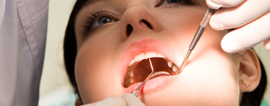Further changes in enhanced CPD scheme 2018
NewsPosted by: manpreet.boora 11th January 2018

The GDC has made changes to the CPD scheme for dental care professionals which came into effect from 1 January 2018.
New support materials for dental professionals on enhanced CPD are now available on the GDC’s website.
Required hours
Changes have been made to the requirements for the number of hours. There will no longer be a need to record non-verifiable CPD.
Many registrants will now have to do more verifiable CPD:
Dentists a minimum 100 hours per five-year cycle (currently 75)
Hygienists, therapists, clinical dental technicians and orthodontic therapists to 75 hours per cycle (currently 50) Dental nurses and technicians, it will remain at 50 hours per cycle
Declarations
All registrants will be required by law to make an annual declaration of the hours they have undertaken (up to now, the declaration was a recommended procedure). The most straightforward way to do this will be through the e-GDC webpage.
Another new requirement is that registrants will not be able to make declarations of zero hours in two consecutive years. And in any two consecutive years, a minimum of ten hours will have to be done. So, if you make a declaration of zero hours in one year, you must do at least 10 hours the following year.
CPD log
You will need to keep a formal log of the CPD you have done. It should list the date, title and number of hours done; it will also have to say which of the four formal GDC learning outcomes it relates to.
These outcomes are defined by the GDC and cover:
A – Communication. This relates to effective communication with patients, team members and others such as NHS officials, suppliers or academics. It might include consent, dealing with complaints or whistleblowing
B – Management. This covers how you manage your own work and your interaction with colleagues whether as a team leader or team member. Learning should focus on how management can be effective, constructive and put the interests of patients first
C – Knowledge. Ensuring that you maintain and develop your knowledge and related skills within your field of practice
D – Skills. Maintaining your skills and how you show this to patients so that they have confidence in your work and the profession at large.
Your log will have to list the relevant letter or letters for the outcome A-D that your CPD covered.
Personal development plan
The use of the personal development plan (PDP) is now a formal, mandatory requirement. PDPs are intended allow you to plan what you want to cover in your CPD in a more formal way and to allow you to reflect on what you have learned (see the next point).
As part of the renewal process, each registrant will make a formal declaration that they are using a PDP, though there will be no requirement to send in the PDP as part of registration renewal. It may, however, be required for audit purposes at some stage.
Reflection
You will be asked to reflect on what you have learned through your CPD activities. This will include how if at all, you have changed your practice as a result.
The GDC, however, does not intend to be prescriptive on how you reflect upon your CPD or indeed how it is recorded. Further guidance is available on the GDC’s website.
What stays the same?
Your CPD cycle stays the same. It has not been re-set at the beginning of 2018. So, dentists who finished their current CPD cycle in December 2017 simply started on the new scheme on 1 January 2018.
Any dentists who are at other stages of their cycle are now part of a transition scheme whereby the declaration they will have to do at the end of their five years will be for some hours undertaken in the old scheme and some in the new.
This sounds complicated and we believe that it might be. The GDC has guidance on this and a transition tool.
They have also said that, from 2018, e-GDC will be providing the relevant calculations directly to every registrant when logging on.
Recommended core subjects
The recommended subjects that have been in place since 2007 (with small changes) will remain as recommendations. Many of them, of course, you might have to do to comply with other requirements – for example, rules on medical emergencies, radiological protection or safeguarding.









